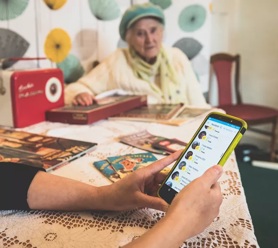Digital Social Care Records Explained
Digital social care records and having a digital social care record system are becoming essential to operating a successful care service.
In England there is a target for 80% of care providers to have a digital social care records in place by March 2024. This is being enabled by an organization called Digital Social Care. They work in partnership with CASPA (Care Software Providers Association), NHS Transformation Directorate (previously called NHSX) and NHS Digital to assist with digitising social care records.
The organization is tasked with enabling and supporting the digitization of social care services in England, specifically to “support the digital journey of social care providers in England and improve the quality of care.”
This page explains the key points to know about digitising social care records, Digital Social Care the organization and some next steps to getting the right system for your service.
Table of Contents
- Digital Social Care – What do they do
- Assessment criteria – Core Requirements
- NHS Approved Supplier List - What is it?
- Adult social care technology fund
- DSCR Assured Supplier List – Financial Support
- What makes Access different?
- Digital Social Care Records Explained
- Benefits of digital care records
- How to select and implement a supplier
Digital Social Care – What do they do?
Digital Social Care is an organisation that supports digitization of social care through a range of approaches, including providing educational resource online, running webinars and other events.
However, their most noteworthy activity to date, that has drawn the attention of care providers all over England, is their Digital Social Care Record (DSCR) system assured supplier initiative.
Digital Social Care Record Assured Supplier Initiative
Through this initiative, Digital Social Care and NHS England assess and approve specific suppliers of ‘Digital Social Care Record’ systems. You may know these types of systems by other names such as electronic care planning or digital care planning systems (I’ll explain what these systems consist of in more detail later in the article).
How will this benefit you? Well, alongside the benefit of having an organization like the NHS Transformation Directorate thoroughly pre-screening and scrutinizing systems and suppliers on your behalf, if you select a supplier on Digital Social Care’s assured supplier list then you can benefit from various financial support to buy and implement that system too.

Assessment criteria – Core Requirements
Suppliers that have been assured have been evaluated against an extensive range of criteria, which I have summarized as:
1. Inclusive care planning and needs assessment
The system must enable you to create assessments and care plans that are person-centred and involve an individual in their own care. You should be able to create and modify care plans and templates within the system and set targets, outcomes or goals for individuals towards which progress can be tracked.
2. Capturing information
You must be able to use the system to capture a vast range of information and types of data, including:
- Structured data, for completed tasks that are linked to the care plan
- Unstructured data, for example comments, additional information about completed activities, which is tied into the care plan
- Both typed notes and verbal notes (using speech to text)
- Upload images and documents to the system
Captured data of all types should provide a “longitudinal picture of the care provided to an individual over time” (i.e. in a timeline) and should be captured and displayed consistently and in a way that is easy to use and absorb.
3. Task Planning
You must be able to use the system to manage tasks within your care service, from allocating duties to the most appropriate staff members, to tracking task status and information in real time and prioritise tasks and easily sort or filter by criteria such as priority, due date, status, person assigned to and so on.
Overdue tasks should be automatically flagged and managers should be able to view task information in useful dashboards. The system must also generate handover information for shift changes.
4. Data Access
The system must allow the right people to access information in a controlled and secured way, including service users, authorized care workers, health professionals, appropriate third parties and so on. Who has accessed which information, with dates, times and what changes were made should be automatically logged and auditable.
5. Data Sharing
You must be able to export data from the system in a flat-file format (e.g. PDF) and an formats like spreadsheets and CSVs so it can be further analyzed or shared with appropriate organisations. Key information for hospital admissions should be generated in a format that is compliant with NHS standards. You should also be able to upload documents into individuals’ care records.
6. Care Setting Management
There are some additional requirements that are more pertinent to how you use the system to generate reports for external stakeholders, such as summary reports for care recipients, reports at a site and service level and reports for use in audits and CQC inspections.
Suppliers are also assessed for their own financial stability, data security and so on.
Through its Standards and Capabilities Roadmap, Digital Social Care will develop these standards. Suppliers in turn will need to keep up with these developing standards, and if they fail to do so they ca be removed or suspended from the assured suppliers list. This creates an extra incentive for all the assured suppliers to maintain and improve standards in line with the Roadmap.

NHS Approved Supplier List - What is it?
If you’re looking for guidance on buying a digital social care record, there’s no better place to start than with the NHS approved supplier list.
The NHS approved suppliers list is actually better known these days as the accredited supplier list, but either way its purpose is to present a list of solutions providers (organisations making software) that meet the rigorous standards set by the NHS – in particular the NHS Digital team.
Digital social care records need to demonstrate standards of security regarding access to patient or client data, as well as protecting said information against cyber attacks (theft, manipulation) and being sharable with other teams, services, and software solutions. This last one, interoperability, is especially important if the NHS wants to achieve its nationwide healthcare ecosystem and provide truly joined-up care wherever people find themselves in need of help. Data transfer needs to be secure, quick, and adhering to the APIs that the NHS uses to ensure correct translation of the coded communications between different organisations.
Adult social care technology fund
Digitising social care, like any aspect of NHS digitisation, isn’t a cheap process if you want to do it properly and ensure quality. The previously mentioned interoperability of software is a complex requirement, though the benefits for digital social care are plenty. Faster access to information means quicker time to treatment, and interlinked systems mean less work needed to replicate patient files – you just access the same longitudinal record and expand upon it.
This is why there is funding available, in the form of the UK Government Adult social care technology fund. This was launched in April 2023 to work aside from the NHS Digitising social care fund, though both are designed to support the onboarding of new software solutions to support care delivery.
The adult social care technology fund is a more speculative approach; designed to test alternative software solutions that may not have NHS accreditation yet but may be an ideal solution in the quest for Trusts to onboard a digital social care record system.
The Adult social care technology fund is open for applications on a rolling basis, with intermittent evaluation periods by the Department of Health to determine who should be awarded funding based on their needs and their business proposal for digitising social care.
DSCR Assured Supplier List – Financial Support
As I’ve mentioned, if you select a supplier on the Assured Supplier List then you can benefit from a range of financial support to enable you to digitize your care records.
This financial support could come via your local authority, local ICS (Integrated Care System), ICB (Integrated Care Board) or your CCG (Clinical Commissioning Group).
What does that mean for you? Well, it depends on precisely where you are in the county. In some cases, funding has been used to pay for the whole first 12 months of the contract, saving care providers thousands to tens of thousands of pounds.
It’s important to reiterate that the precise amount and nature of the funding available will depend on when you decide to purchase and implement a solution which local authority you fall under and your size or type of care services you provide.
You can find out more about your region via the Adult Social Care Digital Transformation Fund portal.
How To Secure Funding For Your Digital Social Care Record System?
The key stipulation in you securing any available funding for digitising social care is to select a digital social care record system from a supplier that is on Digital Social Care/NHS’ approved supplier list.
What makes Access different?
Of course as a representative of Access you would expect me to say our systems are by far the best on the market. I do think that is the case, we have sophisticated care record software that is used by tens of thousands of care providers all across the UK.
However, many other suppliers of DSCR systems will of course tell you theirs is the best and determining which is right for you can be complex and based on lots of different factors, sometimes particular to your care service, or the specific ways you want it to operate.
So, to understand which DSCR system might work best for you, you should arrange demonstrations with those suppliers that seem to fit your needs. Talk to the suppliers about what you need from a system and whether they can deliver on those requirements. Involve colleagues from different parts of the care service to help you make the right decision.
That said, Access is certainly distinct in two key ways, that makes us completely unique.
Firstly, we offer an unrivalled range of other, complimentary software to help you manage your entire care service more efficiently, safely, to improve care quality and grow with scalable savings in time, personnel and money.
These systems include:
- medication management
- eLearning for health and social care
- care compliance
- policies and procedures and more.
All these systems are ‘delivered’ through Access Workspace for Care, to keep everything under one roof, easily accessed with one support team and a range of integrations and analytics to make the software you use greater than the sum of its parts.
Access is also unique in supplying to the full continuum of health and social care. Meaning not only all types of care providers, but also the NHS and other healthcare services, local authorities, social prescribing organisations, charities and every other part of the ecosystem of health, support and care services in the UK and Ireland use our software.
This means we are uniquely placed to help you meet the upcoming challenges of integrated health and care, which the push for digitization of social care records is just one strand of.
Soon, care providers, health and so on will all need to be able to share data and people’s records in order to deliver a more integrated service, we believe we are now best and uniquely equipped to facilitate this transition as easily as possible for all providers.
Digital Social Care Records Explained
I’ve said a lot about Digital Social Care Records (DSCR), and hopefully the Assessment Criteria above has given you an idea of what they should enable you to do, but I think a clear concise summary may help too.
Digital Social Care Records are simply an digital (sometimes called electronic) replacement to the paper care records that care providers have used for decades.
The DSCR includes everything a comprehensive paper care record does, including but not limited to:
- Personal details and profile
- Medical history and details
- Care and support plan
- Assessments (care assessments, risk assessments etc.)
- Medication administration records
- Management tools for your services

Digital Social Care Record System
Digital Social Care Record Systems (DSCR systems) are computer software which care providers use to replace paper care records with Digital Social Care Records within their care services. They include all the elements in the list above (care and support plans, personal details and so on).
DSCR systems will typically have a range of other functionality that helps make care processes more efficient, less prone to failure and care services safer and more compliant.
For example, some DSCR systems include task management and analytics/reporting. They can also automate processes to both reduce the burden on managers and remove as much possibility for human error, tasks being dropped and forgotten, or processes and next steps not being followed.
Similarly many Digital Care Record Systems include automated and triggerable alerts when something happens which requires a particular staff member’s or group’s attention.
Most DSCR systems you will see include a mobile app so that care and nursing staff, managers and other stakeholders, including next of kin and service users, can access and update records wherever they are.
What about medicines?
In domiciliary care and community care settings where medication management is minimal, DSCR systems often include eMAR (electronic medication administration records) as part of the system. In residential services, or services where management of medicines is more involved or complex, a separate electronic medication management system is used.
However it is crucial that your DSCR software is integrated with the medicine management software, in order to maintain record accuracy and avoid contradictions between the systems.
Digital Social Care Records - The Benefits
Mitigating risk and improving safety
When using paper records there is always a chance that someone has out of date information in their hands. This creates risk as care workers may take the wrong action based on incorrect information. Care records in digital systems are synchronised, meaning there is essentially a single, shared care record for all staff.
Through the use of reminders, data validation and other mechanisms, digital care record systems enforce information collection, in the format that you want. This puts a stop to gaps in notes, observations, missed activities, or information being recorded in an improper format, all of which can impact resident safety.
Improved efficiency
Digital care records remove the need to type up, copy, transpose or in any other way duplicate information from one record to another. They make finding the information you need much faster, whether in the office or by a resident’s side. If the system is sophisticated enough, it will automate a range of processes and workflow to help ensure follow up tasks get done, and to reduce burdens on registered managers and other members of staff.
Staff satisfaction
People do not come into the care sector to do admin, to do paperwork. Administrative tasks, whether small or big, or even just finding the right information, can get in the way of providing care and spending meaningful time with residents. Digital care records remove chunks of admin. They free up care workers to focus on caring for residents. Improving data accuracy and workflow also reduces stress caused by not knowing if information is correct, or if flagged concerns are being seen and addressed by managers or colleagues. This all has a positive impact on staff satisfaction and can even go some way to helping you recruit and retain staff, although as we all know this challenge is caused by lots of other factors too.
Actionable insights
When using digital records your care service is constantly, automatically building up a repository of data, on everything from care needs, to incidents, falls and outcomes and more. This data can then be rendered into dashboards and reports that you can use to make more informed decisions. You can harness this data to uncover patterns, trends and even causes, that would otherwise remain invisible or only surface much later, typically after they some sort of adverse event.
Integrated health and care
A key driver behind the push to digital records is the desire for greater integration of local health and care services. In order for this to be a reality, information needs to be easily transferable or directly accessible between different health and care services. Without digitised records this is unfeasible or at least impractical.
Digital social care record system - Choosing the one for you
Of course, given all you’ve read, if you are a care provider in England you will want to select a Digital Social Care Record supplier on the Digital Social Care Assured Supplier List, to benefit from the pre-screening and scrutiny of those systems from NHS England and the range of financial support available.
But choosing which system on the assured list is right for you is trickier. It will depend on your specific requirements, existing systems you use, your service type, size and so on.
Many care providers have suffered financially and seen their services disrupted either by choosing a system that wasn’t a good fit, or not taking the right approach to implementing it. For many care providers this is something completely new and can be complex even for the experienced, so its no surprise that things don’t go as expected.
However, there are steps you can take to select the best system for you and to implement it successfully. To help you do both of these steps successfully and avoid mistakes, if you’re a residential care provider (care homes and nursing homes) you should download this guide to digitizing care records in your service.

 AU & NZ
AU & NZ
 SG
SG
 MY
MY
 US
US
 IE
IE



